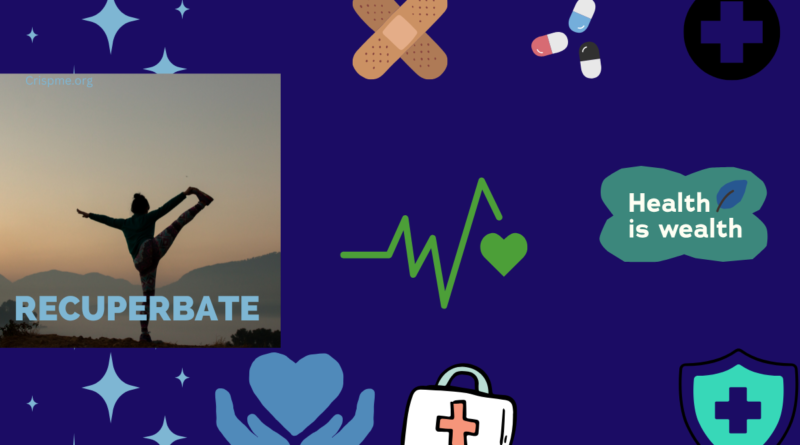The Importance of Recuperbate for Recovery and Well-Being
Introduction
Recuperbate, which emphasizes the body’s and mind’s need to rest, recharge, and maintain balance, is a crucial step in both physical and mental recovery. Prioritizing recovery techniques can greatly improve general well-being in today’s hectic world, which is full of stress and diversions. The many aspects of recuperation are examined in this article, along with its advantages, techniques, and integration into varied lifestyles. People can develop resilience and a deeper sense of serenity in their daily lives by comprehending and putting these principles into practice.
Understanding Recuperbate
Recuperbate entails making tiny, deliberate decisions that encourage relaxation and renewal. These decisions can take many different forms, including mental health treatment, proper food, and mild exercise. The phrase captures a comprehensive approach to healing, highlighting the importance of both mental and physical recovery for a well-rounded existence. Including recuperbate in everyday activities encourages people to pay attention to their bodies and thoughts and cultivates a proactive attitude toward health. Better self-care routines and more mindful living may result from this understanding.
Physical Recovery
For athletes and anybody participating in physically demanding tasks, physical recovery is essential. Over time, people can perform better thanks to active recovery strategies, stretching, and gentle exercises that promote muscle repair and increase flexibility. Getting enough sleep is also essential because it enables the body to heal itself. People can improve their energy levels and general performance by making restorative sleep a priority. Deep breathing techniques, such as box breathing and deep belly breathing, can help reduce tension and heart rates, promoting a more seamless recovery that is good for the body and the mind.
Also Read: Unveiling the Health Benefits of Oridzin: Nature’s Antioxidant Powerhouse
Mental Well-Being
Equally crucial is mental recovery, which enables people to cope with the numerous distractions that life offers. Because the brain is constantly bombarded with stimuli, it needs time to relax in order to perform at its best and stay clear. Journaling, reading, or taking brief breaks while working are among hobbies that might help reduce stress and promote mental clarity. By cultivating a sense of serenity and presence, mindfulness practices can further improve mental recovery. In the end, putting mental health first by engaging in these activities increases resilience to life’s obstacles.
Adapting Recuperbate Practices
Recovery techniques must be customized to meet the demands of each individual because different lifestyles require different recuperation strategies. For example, in order to prevent injury, athletes may incorporate rest days in addition to active rehabilitation methods like stretching and mild exercise. Regular study breaks help students focus and retain material better, which facilitates improved information processing. After lengthy workdays, professionals may need to practice relaxation practices like yoga or meditation to decompress. Self-care should be a top priority for caregivers and those in emotionally demanding occupations in order to prevent burnout, since it improves their capacity to assist others.
The Role of Social Connections
Strong social ties are essential for healing because they offer emotional support. Developing and preserving bonds with friends and family can improve mood, lower stress levels, and forge a solid support system. Social interaction also helps people develop a feeling of purpose and belonging, both of which are critical for mental health. Furthermore, sharing experiences that enhance life might result from spending quality time with loved ones. Simply going outside can improve mood and reduce stress, which supports a more comprehensive approach to rehabilitation. Nature has been shown to have restorative benefits.
Screen Time Management
Controlling screen time is essential for successful recovery in our technologically advanced environment. Limiting consumption and using technology thoughtfully are crucial because excessive screen time might impede recovery attempts. Establishing clear limits, like specified tech-free periods, might assist people in concentrating on relationships and experiences that take place in the real world. Reading or taking up a hobby are examples of offline pursuits that can offer a welcome diversion from screens. By using technology with awareness, one can preserve mental health and foster closer relationships with others and oneself.
Nutrition for Recovery
Since a balanced diet promotes general health and supports the body’s healing processes, it is essential for a speedier recovery. The body’s natural healing processes are supported when a range of fruits, vegetables, lean meats, and healthy fats are consumed. In order to maintain both physical and mental health, proper eating is essential for controlling mood and energy levels. Additionally, because it promotes cellular function and nutrient absorption, staying hydrated is crucial for the best possible recovery. In the end, nourishing the body with mindful eating can result in increased resilience and vitality.
Conclusion
Recuperbate is a holistic approach to promoting physical and mental well-being, not merely a recuperation procedure. People can greatly enhance their quality of life by incorporating activities that support mental clarity, emotional resilience, and physical healing into their everyday routines. The recuperation concepts can be used to any person’s lifestyle, whether it is through physical activity, artistic endeavors, or fostering social relationships. Making recovery a priority can have long-term advantages, promoting a healthier, more balanced lifestyle and enabling people to deal with the challenges of contemporary life more confidently and easily.
Also Read: Why the Vital-Mag.Net Blog is generating buzz?
FAQs
What is recuperbate?
Recuperbate refers to the process of recovering both physically and mentally through intentional practices that promote rest, relaxation, and balance. This holistic approach encompasses various activities and habits designed to enhance overall well-being.
How can I incorporate recuperbate into my daily routine?
You can integrate recuperbate by engaging in gentle exercises, taking breaks during work or study, practicing mindfulness, and ensuring you maintain social connections and a balanced diet. Creating a personalized routine that includes time for self-care and relaxation can significantly enhance your recovery process.
Why is mental recovery important?
Mental recovery is crucial as it helps clear the mind of distractions, improves focus, reduces stress, and enhances overall mental clarity, which is essential for productivity and well-being. It also supports emotional resilience, enabling individuals to better cope with challenges.
What are some effective activities for mental recuperation?
Activities such as journaling, reading, engaging in creative hobbies, and spending time outdoors can all support mental recuperation. Additionally, practicing mindfulness techniques, like meditation or deep breathing, can further enhance mental clarity and emotional balance.
How does nutrition affect recovery?
A balanced diet rich in nutrients supports the body’s recovery processes, provides energy, and enhances mental health, all of which are vital for effective recuperbate. Prioritizing nutrition can lead to improved mood, greater energy levels, and overall well-being, Recuperbate.
How can I manage my screen time for better recuperation?
Limit your screen time by setting specific boundaries, taking regular breaks, and engaging in offline activities to reduce strain and enhance recovery. This balanced approach can help you reconnect with the present moment and improve your mental health.




